Jumaa Alkaabi: "Peace is the goal advocated by all religions"

In today's turbulent times, understanding and the promotion of peace are two key elements that must be reaffirmed in order to achieve a better society for all. To this end, the Foundation for Islamic Culture and Religious Tolerance (FICRT) has promoted the 1st Forum 'From Islam-Christian Dialogue to the Abrahamic Family' in Cordoba, an ideal city for tackling this issue due to its great historical and cultural importance. Many of the most emblematic places in the Andalusian city are the result of the mixture of the three Abrahamic religions, which are the protagonists of the forum.
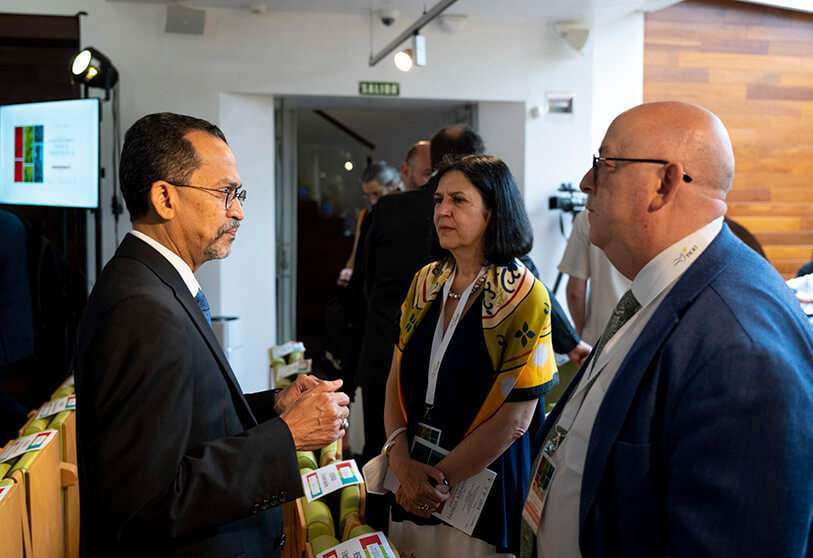
The event, which is being held at Casa Árabe on 16 and 17 May, has the collaboration of the University Institute of Religious Sciences at the Complutense University of Madrid, UNESCO, the UNESCO Chair in Conflict Resolution at the University of Cordoba and the University of Cordoba. This series of conferences follows in the footsteps of the first and second International Islamic-Christian Councils of 1974 and 1979, which also sought to strengthen ties between the different faiths.
Decades later, Cordoba is once again witnessing this scenario, demonstrating that understanding and peace are two principles to which human beings always aspire.

Therefore, the aim of this forum is to work towards the recovery of that unity which allows for diversity, as well as to establish bridges which allow for harmony between different cultures and religions. This is the message that Jumaa Alkaabi, President of FICRT, wanted to convey during his opening speech. "Peace is the goal advocated by all religions," he said, recalling that a civic future will not be achieved without peace and harmony. Alkaabi highlighted the importance of the event, which he described as a "historic meeting", assuring that "it opens a door and a path towards these objectives of peace".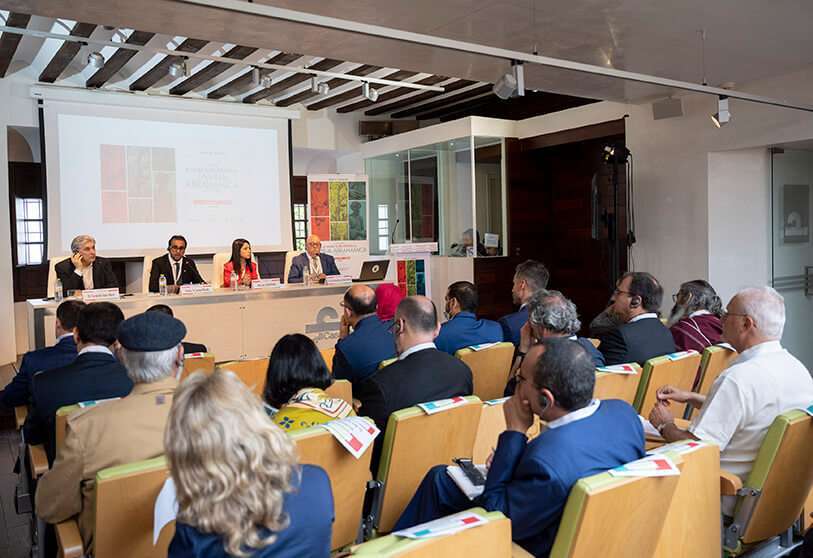 The president of FICRT also stressed that world peace and stability require great effort, courage and wisdom, as well as constructive cooperation between peoples, in order to put aside the differences and feelings of hatred that lead to wars. He also explained that this event is one of many organised by the foundation to work for the implementation of the clauses of the Document on Human Brotherhood. In addition to conferences, FICRT cooperates with religious, non-religious, educational and civil society associations. During his speech, Alkaabi also praised the role of cultural diplomacy in achieving the objectives of the forum, as well as in combating the scourge of sectarianism and violence.
The president of FICRT also stressed that world peace and stability require great effort, courage and wisdom, as well as constructive cooperation between peoples, in order to put aside the differences and feelings of hatred that lead to wars. He also explained that this event is one of many organised by the foundation to work for the implementation of the clauses of the Document on Human Brotherhood. In addition to conferences, FICRT cooperates with religious, non-religious, educational and civil society associations. During his speech, Alkaabi also praised the role of cultural diplomacy in achieving the objectives of the forum, as well as in combating the scourge of sectarianism and violence.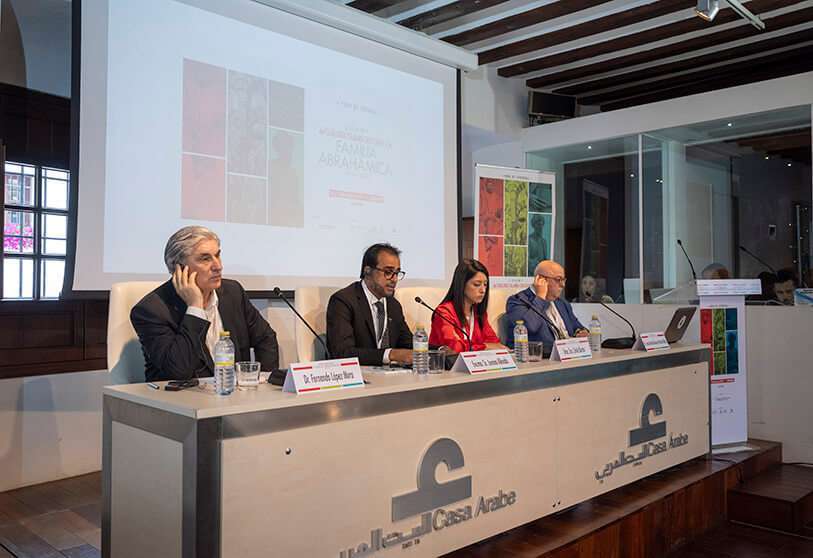
After Alkaabi, it was the turn of Cintia Bustos, a councillor from Cordoba City Council, who praised the role of the city in dialogue on this matter. "Holding these meetings enriches the city and promotes another type of tourism," she declared. Bustos also called on the city to continue working towards an understanding that will allow for a peaceful future. "Thank you for being so concerned about the present and the future," he concluded.

Fernando López Mora, Deputy Director of the UNESCO Chair in Conflict Resolution at the University of Cordoba; and Juan Antonio Álvarez-Pedrosa Nuñez, Director of the University Institute of Religious Sciences at the Complutense University of Madrid (IUCCRR-UCM) also took part in the inauguration. Both reiterated previous statements, stressing the relevance of this type of meeting to promote tolerance and understanding. "Violence cannot have the last word," said Álvarez-Pedrosa Nuñez.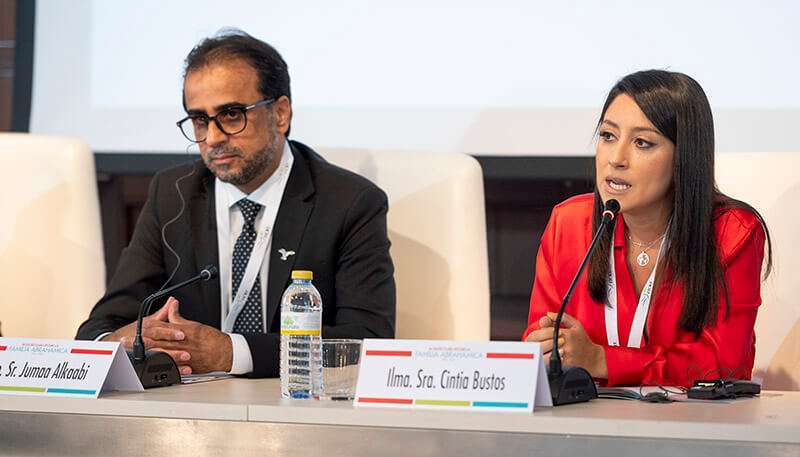
The presentation was followed by the first session, moderated by María Ángeles Gallego, a senior scientist at the Institute of Languages and Cultures of the Mediterranean and the Middle East of the CSIC. These first talks were given by Nedal Alteneiji, Director General of the Zayed House of Islamic Culture in the United Arab Emirates; and Xavier Marín Torné, Doctor of Philosophy and lecturer at the Ramón Llull University.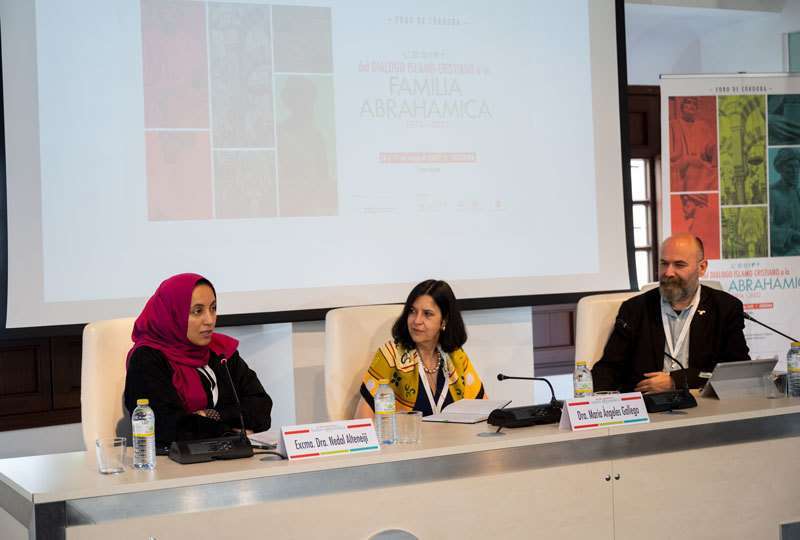
Dr Alteneiji began her presentation by remembering former President Khalifa bin Zayed Al Nahayan, who passed away recently. "We mourn the loss of a charismatic leader who led the country on the path of tolerance," she said. Afterwards, the Emirati focused her speech on the Abrahamic Family House, an architectural and spiritual project promoted by Abu Dhabi that houses a mosque, a church and a synagogue. This project, which will be inaugurated in 2022, represents a unique symbol of coexistence and peace in the region.
The Abrahamic Family House reaffirms the Emirates' role as a country that stands for coexistence and peace. This project began shortly after Pope Francis' visit to the UAE in 2019. In Abu Dhabi, the leader of the Catholic Church met with the Grand Imam of Al-Azhar Ahmad Al-Tayyeb. This symbolic meeting culminated in the signing of the Document on Human Fraternity for World Peace and Common Coexistence. A year later, the historic Abraham Accords were signed, establishing diplomatic relations between the UAE and Israel. This milestone is not only of political and economic value, but also of fundamental social and spiritual significance.
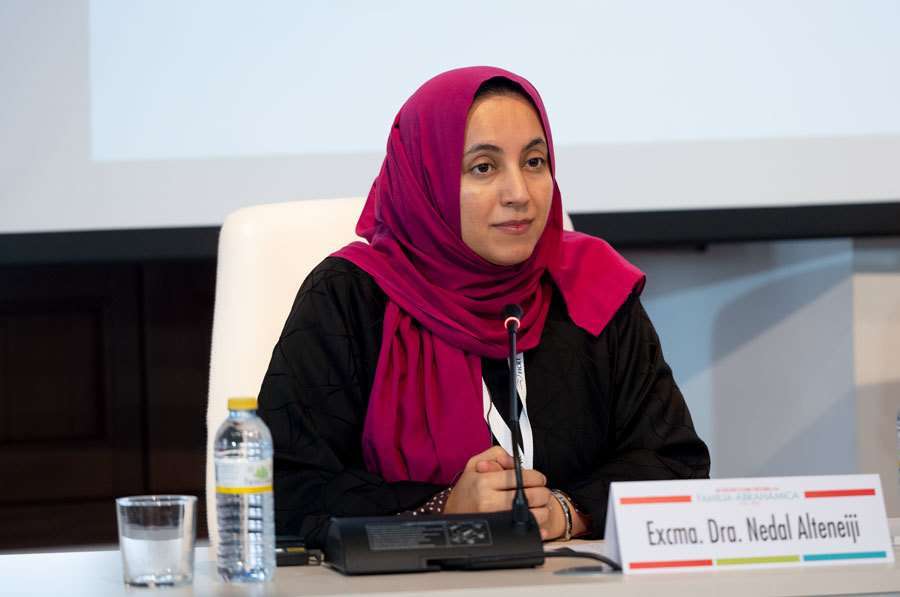
Alteneiji praised his country's role in this regard. "The UAE is a home for all religions. Everyone can practice their faith," he said. For this reason, the director general of the Zayed House of Islamic Culture even compared the Emirati capital to the Andalusian city. "Abu Dhabi is the new Cordoba", she said. The Emirates is trying to follow the Cordoba model of understanding, based on the "sincere brotherhood" of the different cultures in order to benefit on various levels: scientific, cultural, etc.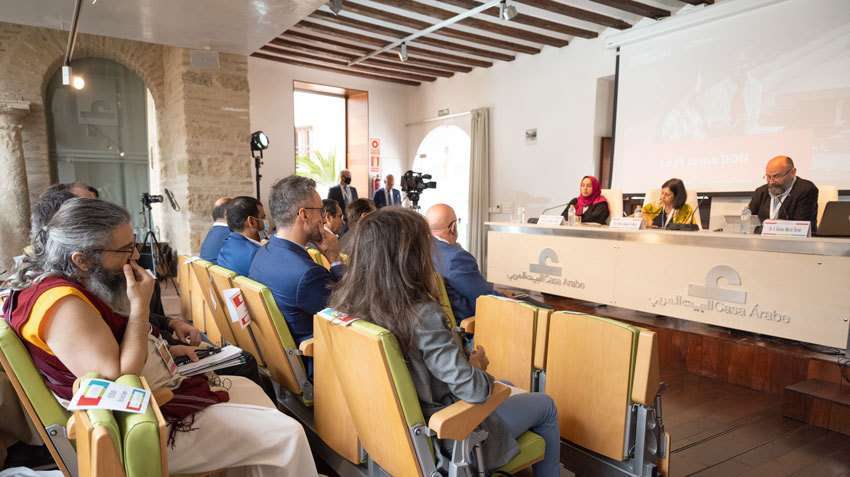
Returning to the House of the Abrahamic Family, Alteneiji affirmed that the three monotheistic religions "share the same values, the same moral principles". He also highlighted several aspects of this initiative, such as promoting the values of inter-religious dialogue, disseminating a culture of tolerance to avoid social and political problems, taking advantage of this space to consolidate common values between religions, and deepening understanding.
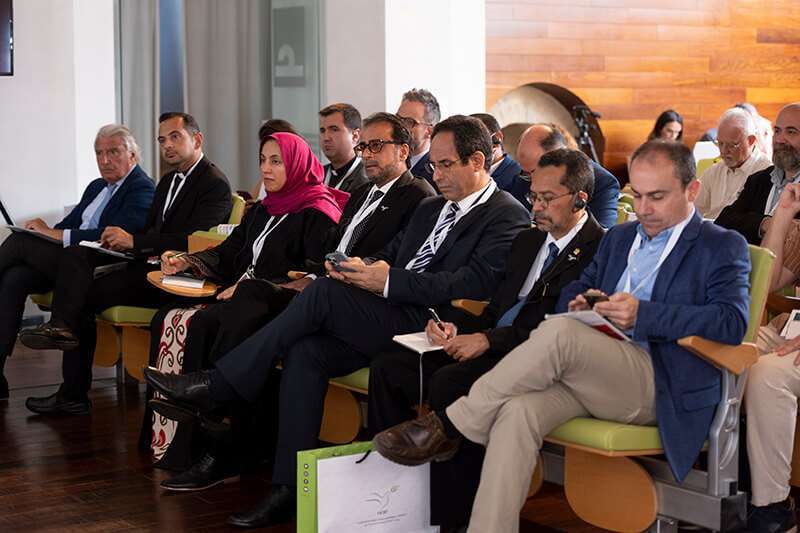
In addition to this project, the UAE has sought to defend tolerance through a law introduced in 2015 against hate crimes that condemns any type of discrimination, as well as the creation of the Ministry of Tolerance. These measures are more than necessary in a country with 200 different nationalities seeking a common life, high human development and national prosperity.
With regard to Emirati society, Alteneiji stresses that Emirati citizens consider their culture as something "essential" that must be preserved and made known. "Our country tries to present its culture and identity to others, but we also want to live with others without erasing any identity or culture," he said.
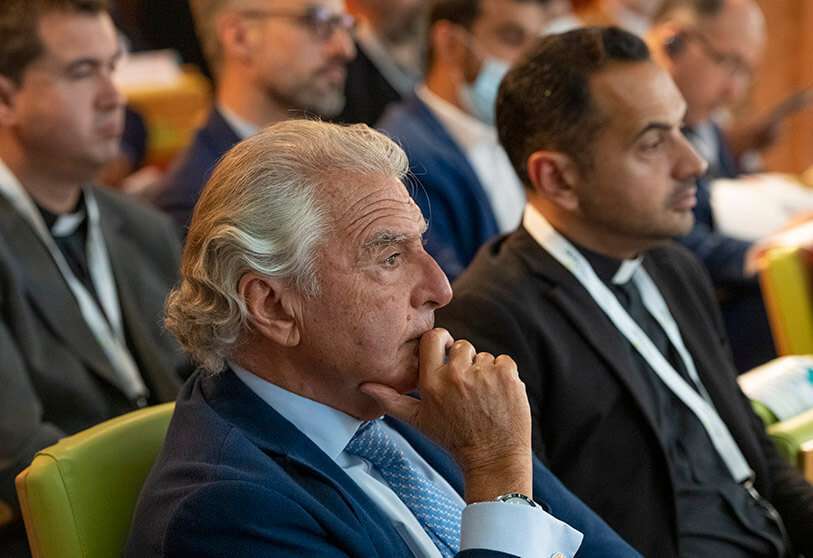 Then it was the turn of Xavier Marín Torné, who based his talk on "the spirituality of fidelity to the legacy of Abraham". This historical and religious figure is a spiritual pillar for the three monotheistic religions, which consider Abraham to be their father. Marín Torné underlines the role of the prophet as a "bridge between religions" that "makes their deep ties visible". There are several characters such as Moses, David, Solomon, Jesus and Mary who are common to the three faiths, but Abraham is "an original and symbolic figure". "In him we always find a common space, we can all recognise him as a home," he said, recalling that Moses, Jesus and Mohammed were inspired by him.
Then it was the turn of Xavier Marín Torné, who based his talk on "the spirituality of fidelity to the legacy of Abraham". This historical and religious figure is a spiritual pillar for the three monotheistic religions, which consider Abraham to be their father. Marín Torné underlines the role of the prophet as a "bridge between religions" that "makes their deep ties visible". There are several characters such as Moses, David, Solomon, Jesus and Mary who are common to the three faiths, but Abraham is "an original and symbolic figure". "In him we always find a common space, we can all recognise him as a home," he said, recalling that Moses, Jesus and Mohammed were inspired by him.
The second session was moderated by Francisco Javier Fernández Vallina, professor of Hebrew and Aramaic Studies at the Complutense University of Madrid, with the participation of Emilio González Ferrín, professor of Islamology and Arab Studies at the University of Seville; Father Josep Buades Fuster, a graduate in Law and Theology assigned to the Jesuit Migrant Service; and Ven. Kutsab Jamyang Dorje, spiritual master and regent of the Sakya Tashi Ling religious community in Olivella (Barcelona).
This table made up of so many different points of view demonstrates how understanding and respect between people with different beliefs and ideals is possible. Moreover, the possibility of expressing different opinions and discussing them enriches and nurtures society.

González Ferrín, who during his professional career has tried to dismantle stereotypes linked to Islam, Arabs and Al Andalus, presented various models of Islamology. He also explained three types of Islam: the religion of Islam, the civilisation of Islam and the Islam that represents contemporary societies. "The third Islam does not inherit or replace the two previous ones", the Islamologist affirmed. The professor also praised the cultural weight of Arabic at the linguistic level, but also in the sciences.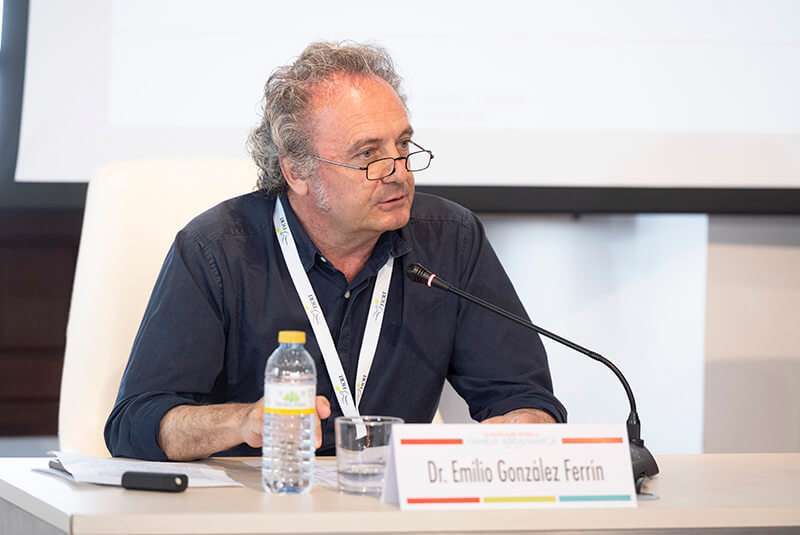
For his part, Father Buades Fuster, during his presentation, recounted experiences related to his work in Melilla, where he works with Frontera Sur. He is constantly in contact with Muslims and seeks common ground. He is also interested in Islam and the Koran. "The Abrahamic religions share common references, we recognise a familiarity", he pointed out.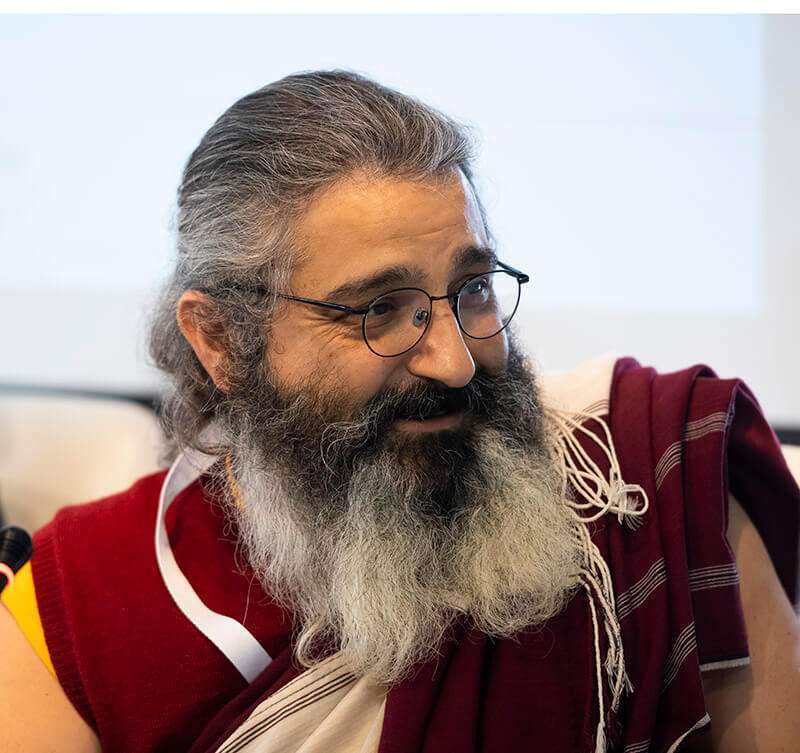 The second session was closed by Kutsab Jamyang Dorje, who focused on the contribution of Buddhism to inter-religious dialogue. The spiritual teacher, who converted at the age of 14, highlighted commonalities that also exist within the Buddhist community. "It is necessary to find a common language in order not to make mistakes of the past," he said. "The effort of dialogue is not useless, it is extremely important," he added.
The second session was closed by Kutsab Jamyang Dorje, who focused on the contribution of Buddhism to inter-religious dialogue. The spiritual teacher, who converted at the age of 14, highlighted commonalities that also exist within the Buddhist community. "It is necessary to find a common language in order not to make mistakes of the past," he said. "The effort of dialogue is not useless, it is extremely important," he added.








